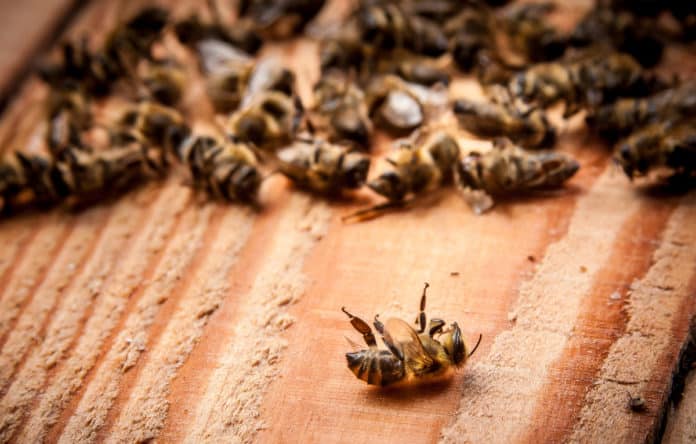Most of the bees found dead in Brazil showed traces of Fipronil, an insecticide prescribed in the European Union and classified as a possible human carcinogen by the US Environmental Protection Agency.
Apis mellifera the species of honey bees found dead showed some signs of sickness and within 48 hrs dropped dead!
Aldo Machado vice president of Brazil’s the Rio Grande do Sul beekeeping association said that as soon as the healthy honey bees got contaminated from the dead ones, the healthy honey bees stared dying en mass.
As many as half a billion bees died in four of Brazil’s southern states in the year’s first months. This event raised a question about the ocean of pesticides used in Brazil’s agricultural sector and whether chemicals are washing through the human food supply – even as the government considers permitting more usage of pesticides.
Brazil witnessed a whopping 27% increase in its pesticide sale since President Jair Bolsonaro took office. Some of the newly permitted pesticide manufacturers include Cropchem and Ouro Fino, Arysta Lifescience, Nufarm and Adama Agricultural Solutions.
According to the Food and Agriculture Organization of the United Nations, Brazil’s pesticide usage increased by 770% from 1990 to 2016. According
to the Agricultural Ministry of Brazil, the ‘fertile nation’ ranks 44th in the world in the use of pesticides per hectare and that, as a tropical country, it is incorrect to compare Brazil’s practices with those of temperate regions.Brazil’s health watchdog Anvisa, in its latest report, stated that 20% of the food samples contained pesticide residues above-permitted levels or contained unauthorized pesticides.
Carlos Alberto Bastos, president of the Apiculturist Association of Brazil’s Federal District, said that the death of bees in Brazil is a warning sign. It proves to the fact that due to the overuse of pesticides, people are being poisoned.
Bees Dead in Brazil- The real scenario
Agriculture accounts for about 18% of Brazil’s economy, the most significant contributor to its GDP. Bolsonaro was elected with strong support from agribusiness and has expressed disdain for environmental concerns. Easing pesticide approvals was a commitment by President Bolsonaro. The agriculture sector has complained for years about slowness. His administration has allowed the industry-wide liberty to use whatever chemicals one likes.
According to Marina Lacorte, a coordinator at Greenpeace Brazil said that about 40% of Brazil’s pesticides are highly or exceptionally highly toxic. In the EU 30% is allowable amount. Approvals to use chemicals are being expedited without proper evaluation by concerned institutions. She says politics is the crucial reason for this.
Andreza Martinez, manager for regulation at Sindiveg, a group representing pesticide producers, said that the government is essentially giving approvals to ingredients rather than the final product. Pests develop resistance to a particular chemical if it’s used repeatedly.
Brazil’s health ministry reported 15,018 cases of agricultural pesticide poisoning in 2018 but acknowledged that this is likely an underestimate. The sudden death of honey bees is undoubtedly an indication of the disastrous effects of pesticides on the environment.
Andresa Batista, one of the victims of pesticide poisoning, recalls the day when she went to work picking soybeans on one of the plantations on the plains surrounding the capital, Brasilia. Soon, she started feeling dizzy and nauseous. More than 40 families fell ill that day, indicating the adverse effects of pesticides. Even one year later, Batista has difficulty in eating, and she has lost 30% of her vision. Doctors are unable to give her a prognosis due to uncertainty about the type of pesticide that poisoned Andresa. Dupont do Brasil, the company that had the contract to manage the field, agreed to pay damages of 50,000 reais ($13,000) to one of Batista’s coworkers that day. Batista said the company paid her 40,000 reais. The sudden death of Bees in Brazil is proof that the pesticides are not just harming Humans but equally on animals as well.
Despite incidents such as the death of bees in Brazil, the Government may accelerate approvals yet further, rebranding pesticides as “agricultural defenses.”
Alceu Moreira, head of the lower house’s Agricultural Ministry says that the image of the Brazilian government is being downgraded by projecting that the nation is overusing pesticides, which they are not.
Though Small organizations and Startups are undertaking steps for organic farming. Tatiana Carvalho, a 31-year old who runs a small organically grown food delivery service in Brasilia, says sales have continuously increased since she started four years ago. She attributes her success to greater consumer awareness.































This is so horrible!